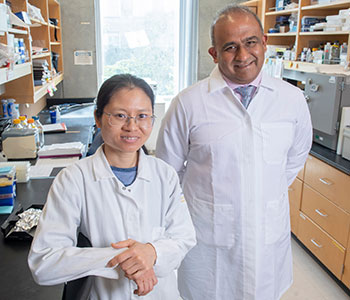UC Irvine researchers discover drug compounds to block angiogenesis in skin and tumors
New blood-vessel branching inhibitors have potential to treat cancer and skin diseases

Irvine, Calif. — A research team led by scientists at the University of California, Irvine has discovered new drug compounds that can block blood-vessel branching in both skin tissue and tumors.
The compounds work by blocking proteins needed to form new blood vessels, a process known as angiogenesis, the researchers report in the study published today in the journal iScience. A team of scientists at the Italian Institute of Technology also contributed to the research.
Anti-angiogenesis drugs have long been used to block tumor growth in many types of cancer. Yet they are largely ineffective at treating melanoma, the most aggressive skin cancer. Most skin tumors need to develop a blood supply to grow beyond 1 millimeter in depth.
The researchers focused on compounds with the potential to disrupt two molecular switches thought to control blood-vessel branching in the skin, CDC42 and RhoJ, said corresponding author and UCI Health dermatologist Anand Ganesan, MD, PhD.
The study measured the effects of the drugs discovered by the Ganesan research team — called CDC42-effector interaction inhibitors — on blood-vessel branching. They compared these CDC42 interaction inhibitors, which can block signals generated by the RhoJ molecular switch, with existing drugs that prevent the CDC42 molecular switch from turning on. They demonstrated that blocking RhoJ, but not CDC42, inhibited blood-vessel branching in skin, said Ganesan, a UC Irvine professor of dermatology and biological chemistry whose lab led the study.
“Importantly, this anti-vascular effect was not limited to skin; the class of drugs also blocked melanoma tumor vascularization and inhibited tumor growth,” he said. “Taken together, the CDC42-effector interaction inhibitors work as selective anti-vascular agents that can be used to treat both cancer and skin disease.”
While further study is needed to decipher exactly how vessel-branching in skin is regulated, Ganesan said the team is now focused on understanding whether CDC42 interaction inhibitors could be used to treat skin conditions characterized by a proliferation of blood vessels, including rosacea and other inherited vascular disorders.
The UC Irvine research team included first author Linh M. Vuong, PhD; Stephanie Hachey, PhD; Jessica Shiu, MD, PhD; Danny F. Xie; Noel Salvador, PhD; Rachel Pham; Vance Ku; Swara D. Limbekar; Terry Nguyen; Bernard Choi, PhD, and Christopher C.W. Hughes, PhD, a UC Irvine Chancellor’s Professor of molecular biology and biochemistry. A team of researchers led by Marco de Vivo at the Italian Institute of Technology in Genoa provided critically important molecular modeling and translational pharmacology expertise.
The research was funded by grants from the National Cancer Institute, the Italian Association for Cancer Research, the National Institute for Arthritis and Musculoskeletal Disease, and the Clinical Innovation Incubator, a new UC Irvine Department of Dermatology program that provides pilot funding to support the development of innovative solutions for clinical problems.
Anand Ganesan, MD, PhD, a UC Irvine dermatologist, is the author or co-author of more than 50 peer-reviewed publications. His research focuses on understanding how signaling between different skin cell types drives the formation of cancer and skin disease. His goal is to develop new therapies to treat melanoma and other skin diseases. Ganesan serves as co-director of Biotechnology, Imaging and Drug Development and co-director for Molecular Diagnostics and Therapeutics at the UCI Health Chao Family Comprehensive Cancer Center. He is also associate dean for Physician-Scientist Development at the UC Irvine School of Medicine and vice chair for research for its Department of Dermatology.
Learn more about UCI Health Dermatology Services.
Read more
- Finding the genetic switch to stop tumor growth ›
- Breakthroughs offer hope for vitiligo patients ›
- Moles can become melanomas through nongenetic cellular transitions, study shows›
About UCI Health
UCI Health, one of California’s largest academic health systems, is the clinical enterprise of the University of California, Irvine. The 1,461-bed system comprises its main campus UCI Health — Orange, its flagship hospital, the UCI Health — Irvine acute care hospital and medical campus, four hospitals and affiliated physicians of the UCI Health Community Network in Orange and Los Angeles counties and a network of ambulatory care centers across the region. UCI Health — Orange provides tertiary and quaternary care and is home to the only Orange County-based National Cancer Institute-designated comprehensive cancer center, high-risk perinatal/neonatal program and American College of Surgeons-verified Level I adult and Level II pediatric trauma center, gold level 1 geriatric emergency department and regional burn center. Powered by UC Irvine, UCI Health serves 5.6 million people in Orange County, western Riverside County and southeast Los Angeles County. Follow us on Facebook, Instagram, LinkedIn and X (formerly Twitter).




